
Give your loved ones the very best this Valentine’s Day with this list of union made sweets and treats.
Visit the list compiled by Labor 411, the union business directory from the Los Angeles County Federation of Labor, for a complete list of products made by union members.
Don’t forget, Union members receive a 20% discount on all Teleflora flowers and GiftTree gift baskets when they browse arrangements and order online at UnionPlus.org/Flowers or call 1-888-667-7779.
Author: paul

Brother Masino, 49, resides in Northeast Philadelphia and has lived in Philadelphia his entire life. He is a third-generation sheet metal worker with a proud family contribution to the sheet metal industry. For nearly 33 years he has been an active member and committed to the advancement of Local 19. He was elected to President/Business Manager in 2011. He started his rise to the top by being elected to the Executive Board in 2000 and held that until 2002 when he was unanimously elected to the position of Organizer. He was an Organizer until 2006 when he was elected as Business Representative.
Gary has received respect from many in the industry and is currently President of the Pennsylvania State Council of Sheet Metal Workers, and Vice President of the Metropolitan Association of Presidents & Business Representatives, Philadelphia AFL-CIO, Mechanical Trades District Council of Delaware Valley and an Executive Board Member of the Pennsylvania State Building Trades and the Pennsylvania State AFL-CIO. He is also the Co-Chairman of the Health & Welfare Funds, Joint Apprentice and Training Council, the Scholarship Fund and the Sheet Metal Industry Advancement Committee of Local 19.
He was appointed to the License & Inspection Appeals Board for the City of Philadelphia in September of 2012 and was appointed to the Philadelphia Zoning board in March of 2014 by Mayor Nutter. Recently, (January 2015), he was appointed to the Governors Transition Committee for Labor & Industry for the State of Pennsylvania.
Gary is a proud father of 2 sons, Gary & Eric. Gary was a graduate of Roman Catholic High School and recently graduated from Widener University and Eric is a junior at The Art Institute of Philadelphia. He is married to his wife Karen and is a step father to her 3 children Brynn, Bobby & Joey.
Even with the evolution of technology, sometimes the flow of communication from the workers on the front lines to the decision makers in the offices can move slowly. To make sure workers’ voices were heard, the International Training Institute (ITI) established an Advisory Committee in 2012 to bridge the communication gap.
After an open discussion with training coordinators during the 2012 Business Agents meeting, General President Joe Nigro suggested the creation of the Advisory Committee, made up of 13 training coordinators, one elected to represent each region of the United States and Canada.
The committee attends two meetings annually, in April and October, and brings to the table concerns collected from each region’s training coordinators. Training centers across the country take turns hosting the meetings. To date, the committee has met in San Jose, California; St. Louis; Washington, D.C. and Portland, Oregon. The next meeting will take place in April in Cleveland.
“We needed a voice. We needed to be heard. If an issue comes up, we need to address it. If we’re having a problem in the field, we need to have a voice,” said Bob Dutra, Advisory Committee chairman and training director for Sheet Metal Workers Local No. 38.
“Before this committee, there would be the coordinators conference where there would be open discussion when all the coordinators were there, but no one wants to be the guy who’s singled out. Here, we bring it to them as a group. And it’s working.”
Questions and concerns about policies, to solutions, to current problems have all been discussed during committee meetings. Last year, members collectively reviewed the ITI’s Accreditation Criteria and made suggestions on changes to the trustees.
“They appreciate the fact trustees listened and made adjustments accordingly,” said Tim Myres, Advisory Committee secretary and training coordinator for Sheet Metal Workers No. 20 in Indianapolis. “It gets the word of the training center coordinators to the trustees, so they understand what we feel the issues are, and they’re listening. I think that’s a huge accomplishment.”
At first, coordinators across the country didn’t offer up much information about what was going on at their centers. Once they realized they were being listened to, that all changed, Dutra said.
“You can see how it unfolds as you’re sitting there,” he added.
“It does change. I think they’re getting more comfortable as they see things happen,” Myres said.
“You get a group of individuals together, and you can bounce ideas off each other. They listen to what’s going on in all areas of the country. The Advisory Committee is a great group. Everyone steps in and isn’t afraid to say what they think or ask a question without hurting anyone’s feelings. It’s refreshing.”
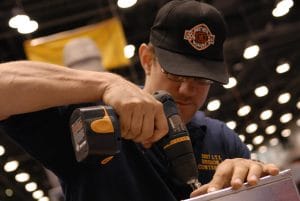
Videos can highlight labor-management success stories, technical skills, recruiting, training or other subjects related to the industry. Only current members of the International Association of Sheet Metal, Air, Rail and Transportation Workers (SMART) or employees of a contractor affiliated with the Sheet Metal and Air Conditioning Contractors’ National Association (SMACNA), SMACNA-SMART Joint Apprenticeship Training Center, or SMACNA chapter may participate.
Entrants must visit the Partners in Progress Facebook page, choose Video Contest, provide their full name; Union number, SMACNA chapter, or affiliated contractor name; valid email address, and the YouTube URL for the video. The Sheet Metal Challenge Video Contest is open for entries from February 1 through March 15. One entry per person.
Beginning March 16, voting will open on Facebook to select the best. Cash prizes for the entries receiving the most votes are $500, $300, and $200 for first through third place.
Outstanding entries will be used on SMACNA’s and SMART’s Web sites, in advertising, and on social media.
Full contest rules available at pinpmagazine.org/contest/videocontest01rules.htm or they may be requested via an email to editor@pinpmagazine.org.
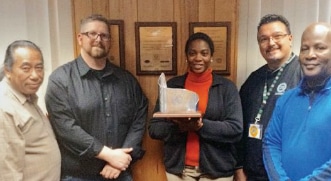
Doctors David Hinkamp and Laura Welch are physicians who partner with SMOHIT to keep workers in good medical condition, while the staff at Sheet Metal Local 28 in Jamaica, New York, works to educate workers on safety and keep their authorizations current. On the contractor side, Jeff Sullivan, safety manager for The Brandt Companies LLC in Dallas, works with Sheet Metal Local 68 to keep employees updated and in compliance with safety standards. Obie Torres, a sheet metal instructor for more than 40 years, has spent his retirement making sure future sheet metal workers know how to stay alive and injury-free on the job site. Don Gallion, outside sales representative for Fasteners Inc. in Las Vegas, provides training and demonstrations on fall protection, scaffolding, proper use of ladders and body harnesses, OSHA, and more.
“It’s inspiring to see what people are doing across the country to ensure our sheet metal workers are safe on the job site and go home to their families every night,” said SMOHIT Administrator Randy Krocka. “These awards shine a light on the excellent work to create a safety culture and the people—from those educating our members to the medical professionals conducting screenings—who go above and beyond to make sure that happens.”
Nominees are selected on the basis of providing exemplary training methodology, outreach activities, wellness activities, research, outstanding program development and implementation, any innovative health and/or safety initiatives, or by using SMOHIT training curricula to create a safety culture within the unionized sheet metal and air conditioning industry.
Hinkamp, co-director of the health in the arts program at University of Illinois, Chicago Hospital School of Public Health, has worked in occupational and environmental health since 1982. When he began working with SMOHIT 25 years ago, the idea was to find clinics to screen workers in major cities for asbestos exposure. Today, Hinkamp travels to 25 cities more than eight to ten weeks out of the year to bring screening services to locals throughout the country, so they don’t have to rely on a clinic.
Members should be screened every five years. Through screenings, other illnesses can be detected, allowing doctors to refer patients to local specialists.
“It’s better to be able to provide top-notch services regardless of where [members] come from,” Hinkamp said. “This program, although it’s focused on asbestos—looks at the whole cardio/respiratory system. Members who take advantage of this program are aware of the importance of these health tools. This is an important program many other organizations have let drop, but it’s the one sheet metal workers have worked hard to preserve.”
Welch has been working as a medical consultant with SMOHIT since 1988, also in the screening program. Her job, however, is to identify physicians, analyze results, and present findings to the SMOHIT board of trustees. A recent retiree from the Center of Construction Research, Training and Safety, Welch knows how to identify health and safety risks on a job site, and more importantly, how to fix them.
“That’s my role in life, my work, to prevent sheet metal workers from hurting their shoulders and backs. Working with SMOHIT has been great because they’re trying to better the health and safety of the workers,” she said. “I love sheet metal workers. Of all the construction trades, they’re my favorite. They’re wonderfully nice people. They show up early. They’re very appreciative. At the local unions, they’re looking out for their members.”
In 1988, 40% of sheet metal workers over age 55 had scarring on their lungs from asbestos exposure. Today, less than 3% of sheet metal workers younger than 60 have scarring, Welch said. This is because workers have been educated to say “no” if contractors want them to perform work that would expose them to asbestos. Educating contractors and workers has been an ongoing effort that’s paying off. Out of 16 construction trades, only the sheet metal workers and one other have a safety organization supported by the union, Welch added.
The next step is to have sheet metal workers fill out a detailed questionnaire when they come in for their screening and breathing test, so Welch can see who is in danger of emphysema due to dust and welding fume exposure.
“I really think it’s improved the health and safety to have SMOHIT there, working with the contractors,” Welch said. “The union supported SMOHIT, which educated people. Sheet metal workers stopped being exposed to asbestos when that wasn’t the case for other trades. And the union stood behind them.”
Evidence of SMOHIT and contractors working together is apparent at The Brandt Companies, where Sullivan has been the safety manager for five years. Also an apprentice instructor for OSHA 10 and 30 at Local 68 in Dallas, Sullivan uses personal experience to keep employees in check. One reality check is to have them write down a message they’d like him to deliver to their families “if they do something dumb and die,” he said.
“I make it personal. The union is a brotherhood, and I don’t like to see my brothers and sisters in pain. A childhood friend of mine died in a construction accident from a fall. If there’s anything I can do to keep them living longer, I’m all about that,” Sullivan added. “I love life. I love seeing my union brothers with their wives and kids. You can’t see them if they’re not safe. There are too many things in this industry that can take your life in a split second.”
The days of doing things the wrong way because a contractor wanted to take shortcuts are rarer than even a decade ago.
“I see the whole construction industry changing. General contractors require so much more safety training,” Sullivan said. If an employee is caught breaking the rules, they are suspended from the job site. For a fall protection- related infraction, workers are sent home for three days. “It’s easier to get them to see we need to take an extra 10 to 15 minutes rather than losing an employee because the general contractor sent him home for a safety violation. They also don’t want a fatality associated with their job site.”
For Local 28 in New York and for Obie Torres, safety instructor for Local 67 in Austin, Texas, teaching safety starts at the beginning when workers are apprentices. Local 28 expanded its OSHA program and made sure all full-time instructors were properly trained in OSHA 500. More than 2,000 members participated in evening OSHA classes this year, while apprentices earned their certificates of completion during the day.
“I’ve been steadily trying to increase safety training since I came into this position. Consistently over the last three years, the goal has been to get all the full-time instructors OSHA-trained and ramp up the crew at night to teach all the members in order to keep up with the industry needs,” said Leah Rambo, Local 28 training coordinator. “Our goal is to make safety part of the culture. For it to be part of the culture, you have to bombard them with it. We want our members to go home every day after work.”
In addition to OSHA classes, Local 28 offers four-hour scaffolding and GHS/ HazCom courses.
“We try to stay ahead of the game, so our members never have to turn down work because they don’t have the proper training,” Rambo added. “A safer worker is a better worker. People do a better job when they feel safe on the job. They go home with their fingers and their lives.”
Torres, a retiree, has a passion for safety and for empowering apprentices with knowledge.
“I’ve had near misses and accidents before certain safety measure were in place,” Torres said. “I’ve been fortunate I’ve never had a serious accident. Back then, working in the shop, you handled sheet metal all day long. I was fortunate I never lost a finger. Things we didn’t do back then are now habit. It has to become a habit like putting on your pants in the morning. And they know they have to take care of their safety equipment. If they do all that, they don’t have to think about it.”
He uses his expertise to empower students to spot safety hazards at work and share them. This turns apprentices into safety champions on their job sites and pushes them to look deeper and pay attention to details.
“It’s not going to be perfect,” he said. “We’re always going to have accidents, but it does get better from one generation to the next.”
Each year, the SMOHIT Safety Awards remind members that our safety culture is growing and that it’s come a long way.
“It is members trying to preserve the health of the members in their community,” Hinkamp said. “It’s people looking out for their colleagues.”
For additional information about the SMOHIT Safety Awards, or any of the programs highlighted here, visit www.smohit.org or call 703-739-7130.
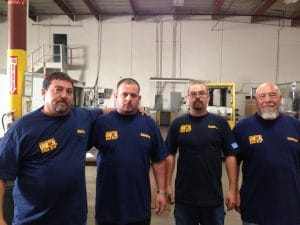
Collins was joined by SMART International Organizer Manny Gonzalez, who held weekly meetings with the workers from Custom-Bilt Metals to discuss forming a union at their workplace. The workers explained their struggles to the organizers, stating that they were unable to make any progress on their own with the company. Together, they decided to try forming a union through SMART.
In mid-September Collins and Gonzalez presented the company’s manager with a recognition demand letter. The company declined. An election petition was then immediately filed with the National Labor Relations Board.
Between the filing of the NLRB petition and reaching a stipulated agreement for an election date, the company hired a union-busting firm and legal representation. The employees were bombarded with anti-union hand bills, captive audience meetings, and one-on-one meetings with the union busters. The company attorney even classified an employee as a supervisor and then proceeded to stack the deck against the vote by adding two anti-union secretaries to the bargaining unit.
The union agreed to these terms with the NLRB, knowing that they still had a solid majority of votes. The company’s strategy was to delay the election date until January or February 2015. On October 29, 2014, the employees sent a clear message to the company that although the company tried to stack the deck against the workers and forced them to endure the propaganda the union busters had presented them, the majority of the workers still want to be represented and voted for SMART.
Since the workers’ union win, the company has eliminated one union supporter’s position, with no other work available. An amicable severance package was negotiated on behalf of the employee. Both parties are now in negotiations, and we will keep members informed as to the status of those negotiations as they develop.
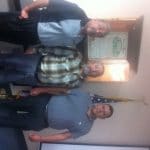
Thomas understands that certain employees in the facility are not represented by any union, and do not see raises on a regular basis. When the new company that took over the contract at Pantex passed on new health care increases to the unrepresented workers, this was the spark Brother Thomas needed to get authorization cards signed. After filing for an NLRB election for some 24 planners and schedulers, and three meetings later with the unit, Thomas went to the election and won.
Winning this election on August 6, 2014, has made the company quite nervous, as there are some 300 employees in this plant who are not represented. Charles Thomas and Local 49 are committed to organizing at Pantex, and Thomas has the full support of his Business Manager, Vince Alvarado, and Subsidized Organizer Isaiah Zemke, both of whom have made themselves available whenever needed.
At this writing Thomas has not yet negotiated a contract, as the company will not agree to a first meeting date. The entire Metal Trades contract expires in February 2015. According to Brother Alvardo, “We will continue to stand for what is right for these workers and will not rest until each and every one of them receives the representation they deserve.”
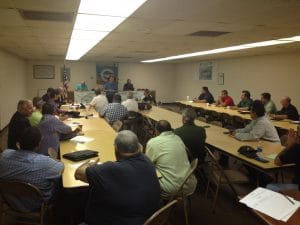 Byggnads construction union, SMART, and other building trades representatives meet and discuss Skanska in Houston, TX.
Byggnads construction union, SMART, and other building trades representatives meet and discuss Skanska in Houston, TX.SMART plays a significant role in two major Global Union Federations (GUFs): the Building and Woodworkers International (BWI), a construction/ mining/forestry-based worker organization that is actively engaged with affiliate unions who represent workers employed at construction giants such as Sweden’s Skanska and Germany’s Hochtief (Turner Construction), and IndustriALL, a GUF that assists SMART in building relationships with other overseas national unions who have common employers in metal manufacturing and auto-related industries.
“In these times of increasing globalization in the construction industry, the relationships that we are forging with unions like the Swedish construction union Byggnads and the BWI are helping us acquire additional leverage to meet the challenges presented to our members by transnational construction corporations,” General President Joe Nigro stated. The consolidation and growth of the global construction market has been accelerating at breakneck speeds, with large construction companies like Manhattanbased Turner Construction having been acquired by German construction giant Hochtief 18 years ago. Since that time Hochtief was taken over by Spanish builder Actividades de Construcción y Servicios SA (ACS), which makes them one of the largest contractors in the world according to ENR’s top 250 Global Contractors for 2015; five of the top ten are Chinese.
Through the work of BWI, U.S., Swedish, and German union representatives, they have assisted in the negotiation of international framework agreements (IFAs) with global construction companies like Skanska—agreements that stress support of the International Labor Organization (ILO) core conventions supporting the right to organize and collectively bargain, among other rights (see inset for an example). These IFAs are used by SMART representatives to open dialog with these and other global construction companies—a process that has successfully gained more market share for many SMART local unions.
SMART Education Director Chris Carlough, who handles global strategies for SMART, also sits on BWI’s World Board as Vice President for North America and has been a key player in building the relationship between SMART and the Swedish union Byggnads. “The leadership of Byggnads, through their General President Johann Lindholm, has brought a whole new level of international cooperation to the table,” Carlough stated. “This will assist us with strategic campaigning and benefit our organizing strategies. I know the Swedes feel that helping the U.S. building trade unions gain market share here in the U.S. helps their union membership as well. They are truly great trade unionists.”
IndustriALL represents 50 million workers in 140 countries in the mining, energy, and manufacturing sectors and is a force in global solidarity, who is taking up the fight for better working conditions and trade union rights around the world. IndustriALL challenges the power of multinational companies and negotiates with them on an expansive global level. They fight for a new economic and social model of globalization, one that puts people and workers first.
Through IndustriALL, key relationships have been forged that have assisted in the successful conclusion of organizing campaigns and contract negotiations. In particular, a northeastern SMART local union was having difficulty coming to a first contract with a newly organized Swedish-owned company whose local management were attempting to surface bargain to impasse. Established relationships between SMART and the Swedish Manufacturing Union led to a visit by the President of that union. He attended several negotiating sessions, during which it was determined that local management was attempting to bargain unfairly. This information made its way back to Sweden, where the union president actually sat on the company’s board. The result was a change at the bargaining table and a new contract for SMART members in the northeast.
Last year the Skanska Works Council invited SMART to make a presentation at their bi-annual meeting, the first time a North American union has ever been asked to participate. Works Councils are bodies representing the employees of a company. Through them, workers are informed and consulted by management on the progress of the business and any significant decision at the European level that could affect their employment or working conditions. Works Council representatives may also be appointed to the Board of Directors. In some countries, like the U.S., workers have virtually no role in company management, however in places like Germany and Sweden, workers have an important role in the company’s management.
Most recently, the BWI and its affiliates were at the AFL-CIO Headquarters in Washington, D.C., where they were honored for work on their campaign to bring justice to migrant construction workers working on projects related to high-profile sporting events such as the World Cup. In close coordination with the global labor movement, BWI exposed the egregious violations of migrant worker rights in a sector of the economy where workers are often trafficked and exploited as forced labor.
Earlier that week the General Secretary—equivalent to our General President—of Byggnads, whose union represents 30 different building trades in one organization and the General Secretary of the Swedish Painters’ Union traveled to Houston, where they and a group of SMART organizers visited nonunion workers on jobsites. At one point during these jobsite visits a non-union superintendent told them, “This isn’t Sweden or New York City. This is Houston and we’re Right to Work!” There was much discussion after this regarding access for union representatives on construction projects here in the U.S.
According to SMART General President Joe Nigro, “We are taking our global relationships to new levels that will give our organizers and representatives the most effective tools to position themselves and the workers they represent with global construction companies. We are looking forward to working closely with our brothers and sisters from around the globe.”
Core Element of Global Framework Agreement
1. Freedom of association and the right to collective bargaining are respected
All workers shall have the right to form and join trade unions of their own choice. These unions shall have the right to be recognized for the purpose of collective bargaining in conformance with ILO Conventions 87 and 98. Workers’ representatives shall not be subjected to any discrimination and shall have access to all necessary workplaces in order to carry out their duties as representatives (ILO Convention 135 and Recommendation 143). The company shall take a positive attitude to trade union activities, including union access to workers in the organizing process. The company will follow the most efficient process in the event that BWI affiliate requests union recognition.

The ruling comes in response to the Saskatchewan Federation of Labor’s legal challenge of a 2008 provincial law that limited who could and could not strike. Opponents of the law argued that the Saskatchewan government hoped the legislation would allow the government to unilaterally determine who was essential and who was not. The legislation did not include any type of dispute resolution process and was handcuffed by the Saskatchewan Labour Relations Board.
This decision comes on the heels of a decision from the Canadian Supreme Court that reaffirmed the right to collectively bargain. The landmark case centered around the Mounted Police Associations of Ontario, which won the fight against legislation that previously barred RCMP officers from from forming a union.
These decisions are perfectly summed up by Supreme Court Justice Abella who noted that clearly the arc bends increasingly towards workplace justice.

Our first agreement is with participating Gold’s Gyms nationwide. They are offering any member of SMART (and family members living in the same household) approximately 10% off membership dues. All you have to do is show your SMART dues receipt when you sign up. We have provided a list of participating gyms here.
Gold’s Gym is offering SMART members a special $1 only to join from February 8th – 14th. If you do not see a gym in your area, please contact SMOHIT for help finding a facility near you. SMOHIT is also in negotiations with other health and fitness organizations to offer you similar discounts. Stay tuned for future announcements!